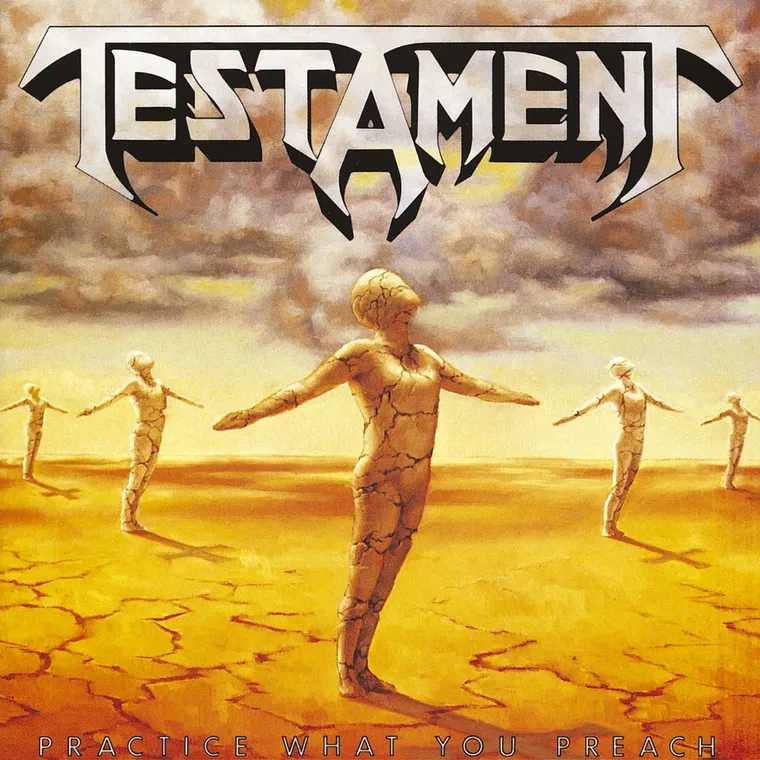Released on August 4, 1989, Practice What You Preach is Testament’s maturation point—an album that expanded their thrash foundation into more melodic, socially conscious, and musically ambitious territory. Building on the intensity of The New Order, this third record introduced a broader lyrical scope, more dynamic arrangements, and a refined sense of control. This wasn’t just another thrash album—it was Testament growing into their identity.
At its core, Practice What You Preach shifts Testament away from purely apocalyptic or occult themes toward real-world introspection. The band began tackling hypocrisy, corruption, and spiritual conflict with a seriousness that matched their sharpened musicianship. Every track pulses with urgency, but now the fury had focus.
In an era when thrash was either going more extreme or veering toward commercialism, Practice What You Preach carved its own path. It was heavy—but articulate. Complex—but memorable. This album didn’t just preach—it practiced evolution.
Belief, Brutality, and Balance: The Message Takes Shape
“Practice What You Preach” opens the record with a commanding declaration. Built on chugging riffs and commanding vocals, it’s a thrash anthem rooted in contradiction and disillusionment. Chuck Billy challenges the moral hypocrisy of leaders and institutions, sounding both angry and empowered.
“Perilous Nation” dives deeper into political territory, riding on Alex Skolnick’s intricate leads and Eric Peterson’s slicing rhythm work. It’s one of the band’s most pointed critiques, yet never sacrifices musicality for message.
“Envy Life” is an underrated gem—groovy, mid-tempo, and refreshingly experimental. It showcases Testament’s willingness to break from speed for the sake of feel, even weaving in unexpected acoustic textures without losing bite.
“Time Is Coming” races forward with urgency. Driven by Louie Clemente’s tight, galloping drumming and Billy’s commanding vocal phrasing, it captures the band’s tightest rhythm work to date. This is forward-looking thrash: cleaner, sharper, still lethal.
Riffs, Reflection, and Righteous Fury: The Album Expands
“Blessed in Contempt” slams into more classic Testament territory, returning to darker lyrical ground. It’s furious and punishing but never chaotic—each riff is a precision strike, especially as the band shifts from groove to full-blown speed in the bridge.
“Greenhouse Effect” stands out as a thrash-era environmental warning—decades ahead of its time. The lyrical content may feel prophetic now, but what really drives it home is the tight songwriting and that relentless main riff.
“Sins of Omission” is a highlight—moody, melodic, and layered with a surprising emotional weight. Skolnick’s leads shine with feeling here, not just flash, and Billy’s performance is one of his most nuanced on the record.
“The Ballad” was a risk—and a bold one. Testament’s answer to Metallica’s “Fade to Black,” it begins soft and somber before exploding into double-bass fury and towering solos. It’s one of the best examples of Testament’s ability to fuse melody with muscle without compromise.
“Nightingale” closes the album with a haunting melody and lyrical ambiguity. The band leans into mood and dynamics here, ending not with a bang, but with a thoughtful fade—unexpected, but effective.
Precision and Purpose: The Players Deliver
Chuck Billy had always been a strong vocalist, but Practice What You Preach marked his transformation into a truly commanding frontman. His phrasing, power, and range all improved here, and his clean vocals add dimension without losing menace.
Alex Skolnick delivers a masterclass in soloing. Every lead is expressive, technically dazzling, but never indulgent. He weaves melody through aggression like few others in thrash could at the time.
Eric Peterson’s rhythm guitar anchors the album with rock-solid riffing—tight, punchy, and always in service to the song. His partnership with Skolnick is crucial: fire and finesse in perfect sync.
Greg Christian’s bass playing often goes unnoticed, but his tone and agility subtly drive the low end. He doesn’t just follow the guitars—he fills space and adds heft, particularly on slower, more atmospheric tracks.
Louie Clemente provides one of his tightest drum performances on record. He’s not flashy, but his timing, groove, and tasteful restraint give Practice What You Preach a polished, professional backbone.
Produced by Alex Perialas, the album sounds clean without being sanitized. The guitar tones are thick, the drums punchy, and the vocals cut through without overpowering. It was a leap in fidelity from The New Order—and it shows.
Final Verdict: 9/10
Practice What You Preach is a milestone in Testament’s career and a key chapter in thrash metal’s evolution. It balances aggression with intelligence, speed with soul, and fury with finesse. Lyrically thoughtful and musically adventurous, it proved that Testament could transcend genre tropes without abandoning their core.
Thirty-five years later, it still holds weight—not just as a product of its time, but as a timeless statement of integrity and progression. Testament didn’t just tell the world to practice what it preached—they did it, riff by riff.

